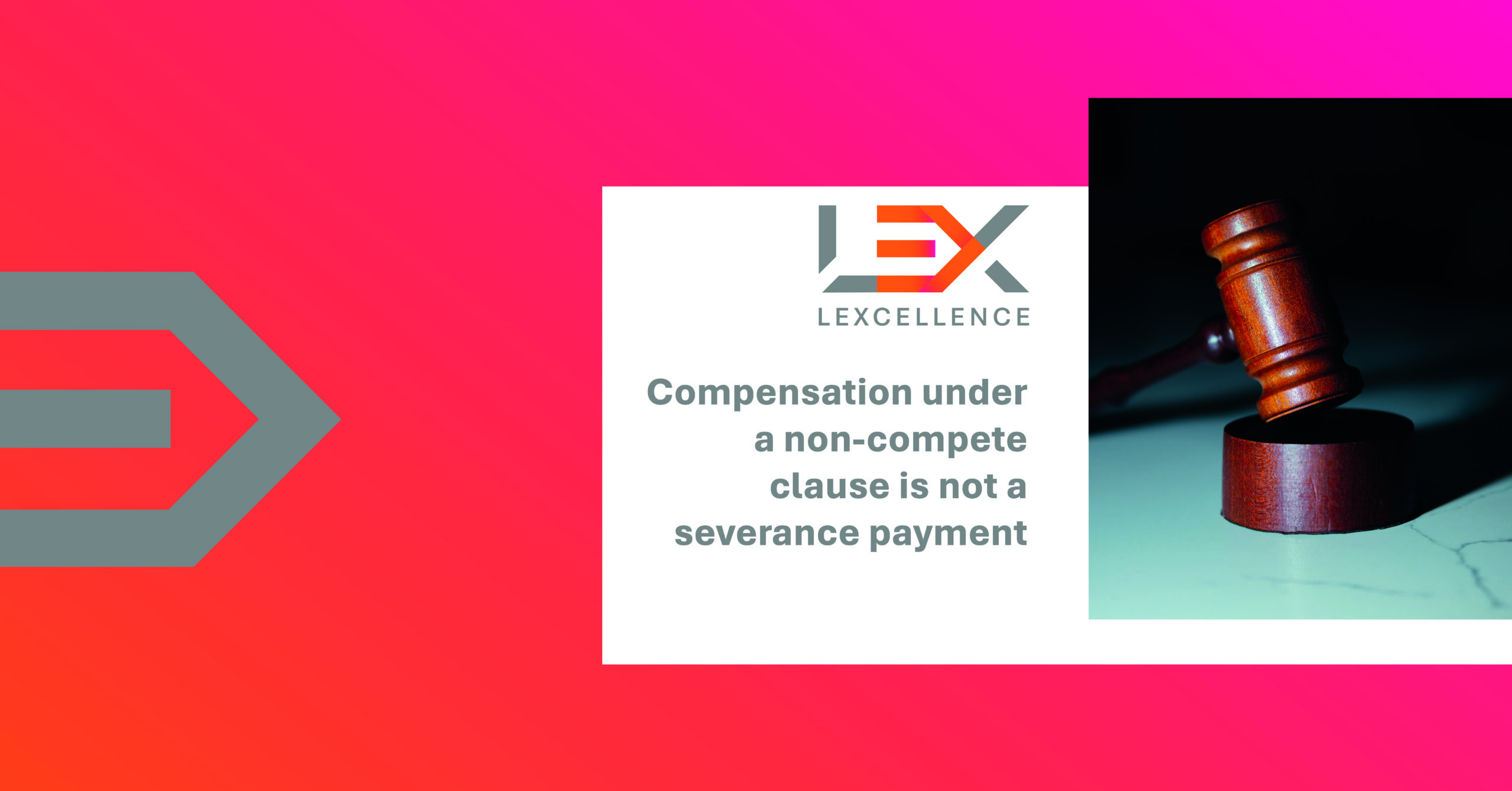Compensation under a non-compete clause is not a severance payment

Our foreign clients often ask us how compensation for non-competition should be interpreted under non-compete clauses following the termination of the employment relationship. Many employees assume that what was agreed in the employment contract also applies in the event of termination by the employer.
I. General
Pursuant to Article 340 para. 1 of the Swiss Code of Obligations (“CO”), an employee may undertake to the employer to refrain from carrying out any competitive activities towards the employer after the termination of the employment relationship. The prohibition must be appropriately restricted with regard to place, time and scope such that it does not unfairly compromise the employee’s future economic activity; it may exceed three years only in special circumstances.There is no legal obligation for the employer to pay compensation for a post-contractual non-competition clause. However, Article 340a para. 2 CO sets out that any consideration on the part of the employer; in particular, any compensation for non-competition must be duly taken into account when assessing the limitations of the non-compete clause as stated above. The compensation for non-competition represents a financial consideration paid by the employer for the employee complying with the non-competition clause, in order to mitigate the potential effects of such a ban on the employee (such as reduced opportunities on the labour market). It should be noted that compensation for non-competition is not regarded as compensation for damage, but as remuneration for refraining from competing activities.
II. Conditions of validity of the non-compete clause
Employees are generally under a non-competition obligation during their employment relationship, whereby the employee is prohibited from undertaking competitive activities, whether in return for payment or free of charge, for others or for themselves. This obligation arises from the employee’s duty of loyalty and the prohibition generally ends with the termination of the employment relationship. However, the prohibition can be extended with a post-contractual non-compete clause. In order to enforce such a prohibition, various conditions of validity must be met: 1) the employee must have the capacity to act, 2) the clause must be in writing and 3) the employee must have access to company secrets that could cause significant possibility of damage if revealed. In addition, the non-compete clause must be reasonably limited in terms of place, time and subject matter.
III. Cancellation of the non-compete clause
As a rule, the non-compete clause ends at the end of the contractually agreed term. Alternatively, the non-compete clause can be cancelled by a unilateral or bilateral cancellation agreement. Article 340c CO, on the other hand, sets out reasons that lead to the cancellation of the non-competition clause before the actual expiry of the term. This means that the non-competition clause lapses if the employer can prove that it no longer has a significant interest in maintaining it. Surprisingly, it is often overlooked in business practice that the termination of the employment relationship by the employer generally leads to the automatic cancellation of the non-competition clause where the termination is without justified cause on the part of the employee. In fact, this means that the employer must be aware that it is highly likely that it will lose the protection of the non-compete clause as a result of the dismissal. The employer is also free to waive the agreed non-competition clause.
IV. Compensation for non-competition in the absence of a non-compete clause
If a non-compete clause ends due to the employer terminating the relationship without good cause on the part of the employee, what effects does this have on the compensation for non-competition? Is the compensation for non-competition still owed in this case?
Opinions on this are split and it is controversial whether the compensation for non-competition also ends with the non-compete clause. In a recent decision, the Zurich High Court ruled that once the non-compete clause ceases to apply, the compensation for non-competition also ceases to apply. In my opinion this is correct, because when the employment relationship is terminated by the employer, it cannot be assumed that the employee has made arrangements in considerations of the non-competition clause. The employee will assume that, in the absence of justified cause, he or she is not subject to a non-compete clause and therefore will not receive non-compete compensation.
V. Compensation non-compete as potential severance pay
Whether the employee can claim compensation for non-competition depends on the interpretation of the individual contractual provisions. It must therefore be determined whether the compensation for non-competition is due under the non-compete clause or whether compensation would be owed irrespective of an effective non-compete clause in the event of any termination, and should therefore be qualified as severance pay. If the non-compete clause is linked to compensation for a non-competition obligation, it creates a bilateral contract in which the compensation payment is the consideration for the employee not carrying out competing activities.
For listed companies, Article 735c para. 1 CO stipulates that members of a company’s board of directors, executive board and advisory board, or for individuals closely associated with them, cannot be paid severance payments on the basis of a contract or articles of association. In practice, post-contractual non-compete clauses for senior executives are usually subject to a waiting allowance. In these cases, it must be determined whether the compensation for non-competition constitutes an unlawful severance payment. As already mentioned, the severance pay is not a lump-sum severance payment without consideration, but is paid in return for the employee refraining from competitive activities, and thereby not causing any damage to the former employer. As the compensation for non-competition is linked to the non-compete clause, it can only be paid out if the non-compete clause can actually be enforced – otherwise it could be an inadmissible severance payment.
VI. Conclusion
In conclusion, it can be stated that, if the non-compete clause ceases to apply, the compensation for non-competition also ceases to apply. In the case of listed companies, care must be taken to ensure that the compensation for non-competition is not a hidden severance payment. Compensation for non-competition should therefore only be paid if the non-compete clause is actually enforceable and the (former) employee is not engaging in competitive activities in return for the compensation for non-competition.
